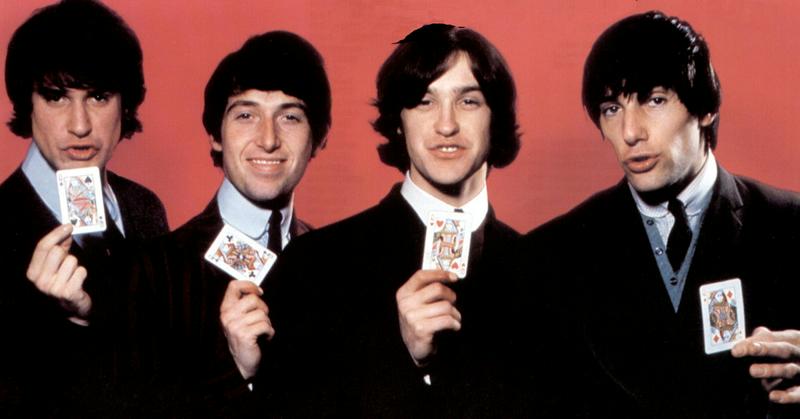Why Didn't The Kinks Catch On In America? Their Self-Destructive Story
By | June 19, 2020

The Kinks are responsible for many rock classics, including "You Really Got Me," "All Day And All Of The Night," and "Tired Of Waiting For You." Those three early hits came out in 1964-65, when The Kinks were part of the British Invasion, and all made the top ten of the U.S. Billboard pop chart. Then the group essentially sat out the rest of the decade, as far as American listeners were concerned -- it wasn't until "Lola," in 1970, that the Kinks would again crack the U.S. top ten.
This absence was actually more like exile. The Kinks weren't welcome in the States. Just as their musical star was rising, they irritated the powers that be in the American concert business, and earned a ban that lasted four years. Like overserved party guests, they were asked to leave, and not invited back.

Fronted by Ray Davies, with his brother Dave Davies on lead guitar, Mick Avory on drums and Pete Quaife on bass, The Kinks were an important group who released a lot of great music in the late '60s. But compared to their fellow British Invaders -- The Beatles, The Who, The Stones -- The Kinks were a non-entity in the States.
The Kinks remain a cautionary tale for British bands trying to make it in America. In the early '60s, British music was completely absent from the U.S. pop scene, but that changed when American listeners heard The Beatles in late 1963 and early 1964. The groups that came through the door opened by The Beatles' massive success included The Who, The Rolling Stones, The Kinks, The Dave Clark Five, The Hollies, Herman's Hermits, The Animals, The Zombies and others. In the Groovy era, no other country could fire up the afterburners of fame and fortune like America.
The British Rock Invasion

Between ‘64 and ‘66, 13 bands who ended up in the Rock and Roll Hall of Fame came to America as rock stars and left as superstars. The Kinks eventually found their rightful place in the Hall of Fame but in no part thanks to their American performances. This is what not to do when coming to America. According to their biography, the band’s motto was “if it ain't broke, break it."
Internal Dysfunction

As a band, you can’t argue with the merits of The Kinks -- there’s ample reason for them to be enshrined in the Rock Hall of Fame. However, there was the slight problem that the band appeared to hate each other. They fought like cats on cocaine. In one particularly memorable battle, drummer Mick Avory whipped a cymbal at Dave Davies’ head after Davies’ informed the drummer that “your drumming's s**t – they'd sound better if you played them with your c**k."
Professional Aggravators

Unfortunately, for the band, they didn’t just get on each other’s nerves. On their first ill-fated trip to America, sales started out slow. That meant the band didn’t get paid in cash, as agreed. In retaliation, the band played a shortened set in Reno. Then they followed that up with an extremely extended version of “You Really Got Me” for most of the concert in Sacramento. Everything really went to hell when the band showed up late for a gig. Ray Davies remembers the portentous altercation in his autobiography.
"Some guy who said he worked for the TV company walked up and accused us of being late. ... Then he started making anti-British comments. Things like ‘Just because the Beatles did it, every mop-topped, spotty-faced limey juvenile thinks he can come over here and make a career for himself. You’re just a bunch of Commie wimps. When the Russians take over Britain, don’t expect us to come over and save you this time. The Kinks, huh? Well, once I file my report on you guys, you’ll never work in the U.S.A. again. You’re gonna find out just how powerful America is, you limey bastard!’ The rest is a blur. However, I do recall being pushed and swinging a punch and being punched back.”
A Four Year Ban

In response to their behavior, the American Federation of Musicians essentially banned The Kinks from America for four years. As Ray Davies said, “In many respects, that ridiculous ban took away the best years of The Kinks’ career when the original band was performing at its peak.” By 1969, “The Woodstock generation had arrived and the Kinks were almost forgotten.”
As destructive as their behavior was, it might have been exactly what the group wanted. Mass popularity was never their aim. In the early ‘70s, The Kinks enjoyed something of a revival with “Lola” and “Apeman.” The band’s response to success was mixed, “It did have that smell of: 'Oh blimey, not that again,'" remembered Dave Davies.
Eventually, they found a semblance of footing in America, thanks to the anti-war sentiment. But their recollections of that first haunted trip never quite went away. “The Village Green” was an anti-war album and there were many anti-war activists in America, particularly among young college students,” wrote Davies in his autobiography. Somehow this uncommercial record could spark off something in the American psyche. In a strange way, things were looking up. We were not selling records, but we had become a cult band. Perhaps the ban had been a blessing in disguise.
“God bless America. The place is great," Davies added. "The real Americans are fine people. But the undercurrent of corruption that I experienced on my first tour there never went away."
